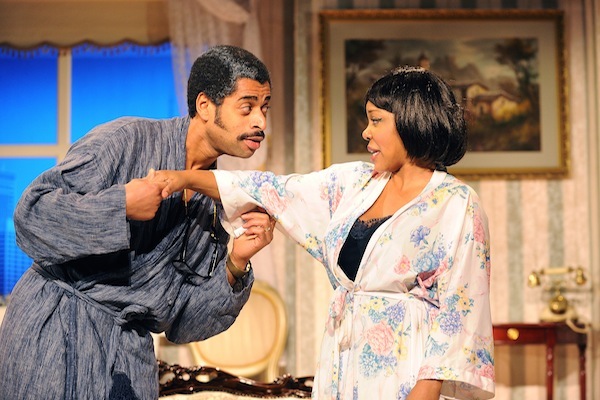Meet Fenton. He’s a psycho. A year or so back he was banged up for murdering a preppy teenage girl in one of America’s less-enlightened southern states. Enter a campaigning congressman, John Daniels, who hopes to teach Fenton to read and write and to help him make something of his ruined life. The opening of Richard Vergette’s play is intriguing enough but a savage twist is on its way.
Fenton rejects all the congressman’s overtures. Asked to recite the alphabet, he glares and grunts and spits out monosyllabic expletives. The only expressive medium for which he shows any talent is the flinging of furniture at high speed across the interrogation room. These chair-chucking episodes are interrupted by a Jesus-freak warder, who likes to barge in and use Fenton’s head for drum practice with his nightstick.
Congressman Daniels finally reaches the nub of Fenton’s problem: short sight. A bright but rebellious kid, he was banished to the rear of class at school and his poor vision wrecked his chances of learning. This breakthrough enables Daniels to tame his quarry and to persuade him to take up reading. Now the twist. The victim of Fenton’s crime was Daniels’s only daughter. This tense and fascinating set-up develops into a thrilling psychological chess match. Daniels succeeds in nurturing Fenton’s love of literature and we scroll forward a couple of months and discover the pair, like an old married couple, swapping choice paragraphs from favourite novels.
Daniels then gets Fenton to act as spokesman for his prison-reform campaign, and when the programme becomes successful, Daniels lands an important Washington job. Fenton realises he’s been had. Daniels has used him as a pawn in his long-term plan to capture the presidency. Several more moves complicate this absorbing play and it ends with the true identity of the murderer left tantalisingly unclear. Lisa Forrell’s low-budget production is a tad short of humour and warmth but these are minor objections. The script is easily strong enough to make a decent American indie flick. I enjoyed Ryan Gage’s clenched, louring presence as Fenton. And David Schaal, as the bruise-mongering, truncheon-wielding warder, plays the role with plenty of loose-limbed gusto.
All eyes are on the Trike where Indhu Rubasingham took over from Nicolas Kent last year. Running a London fringe theatre is as tough as managing in the Premier League. One or two slip-ups are acceptable, but three blunders on the trot and there’ll be calls for your head. Ms Rubasingham started strongly with a Victorian racism comedy, Red Velvet. Her next choice is another examination of racial archetypes, One Monkey Don’t Stop No Show.
We’re in the early 1980s — stylistically indistinguishable from the mid-1970s — and we meet two commonplace African–American characters. Avery Harrison is a rich preacher living in a posh white suburb, and his affable prosperity is contrasted with the rough manners of Caleb Johnson, a streetwise hustler who runs a seedy nightclub. When Caleb becomes the guardian of a geeky southern teenager, he immediately sets about seducing her. But she’s having none of it.
The glory of this play is that it examines sexual prurience and class division as much as race. At its heart there’s an uptight matriarchal figure whom every audience will recognise and adore. Myra, the preacher’s wife, is a needy and pretentious social climber whose attempts to mimic white mannerisms are pitiful and hilarious. She likes to serve ‘Franche’ food and she refers to her hospitality as the ‘hostility’, which it usually is. Her son, Felix, completes the family unit. ‘An all-American colored boy’, Felix has been brainwashed from birth to behave like a Wasp and to pursue a career in dentistry. He rightly loathes the ethnic guinea pig he has become. Trained to move easily in every milieu, he is effectively exiled from all of them. So he abandons his studies and takes up with a poor black girl who, naturally, orders him straight back to school and tells him to fix teeth.
The play’s sweet-natured outlook and its amused chiding of social conventions make it feel cosily familiar. It’s all terribly English. The cloying, manipulative Myra is wonderfully played by Jocelyn Jee Esien, who delivers her malapropisms with just the right hint of exaggeration. Isaac Ssebandeke, as the hyperactive Felix, looks like a young actor who’s going places other than the Job Centre. Author Don Evans, who died ten years ago aged 65, left behind a hefty back catalogue of comedies, some of which have never been performed. This breezy, upbeat production will trigger a revival of interest in his work. More like this, please. In fact, let’s have the lot.







Comments